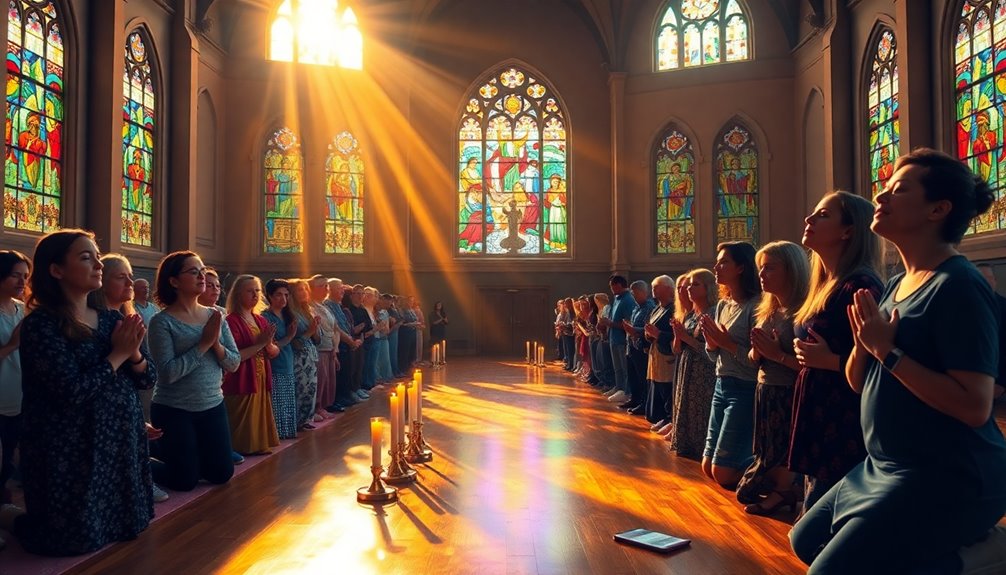The power of prayer goes beyond mere words; it's a vital connection to God that enhances your spiritual growth and emotional well-being. When you pray regularly, you align your desires with divine will, leading to personal transformation. Prayer can reduce anxiety and promote inner peace, offering refuge during stressful times. It's not just about asking for help; it's also about gratitude, reflection, and building a relationship with the divine. Embracing prayer as a daily practice opens the door to deeper spiritual experiences. To discover how prayer can reshape your life, continue exploring its many dimensions and benefits.
Key Takeaways
- Prayer enhances communication with God, fostering spiritual growth and a deeper, more personal relationship beyond just requests.
- Regular prayer provides emotional and mental health benefits, reducing anxiety and improving overall well-being.
- It aligns individual desires with God's will, promoting personal transformation and deeper connections with the divine.
- Group prayer cultivates community support and amplifies individual prayers, enhancing the spiritual journey collectively.
- Daily practices like journaling and gratitude in prayer deepen reflection and shift focus from worries to positivity.
Introduction

Prayer plays a crucial role in the lives of countless individuals, serving as a direct line of communication with God. When you pray, you open your heart and mind, allowing the Lord to guide your thoughts and actions. This powerful form of communication not only enhances your spiritual growth but also deepens your personal connection with the divine.
As you ask for guidance and strength, prayer becomes a vital aspect of your Christian faith. Many believers find that regular prayer leads to emotional and mental health benefits, like reduced anxiety and improved focus. In times of challenge, it's this resilience that helps you navigate life's storms.
Moreover, prayer isn't just a solitary act; it fosters community. When you engage in group prayer, you reinforce interpersonal relationships and create support networks, offering strength to one another during crises.
As you seek divine guidance, aligning your desires with God's will, you truly embrace the transformative power of prayer. Remember, each time you bow your head, you're not just asking for help; you're building a profound relationship with the Lord that can shape your life in remarkable ways.
Scriptural Insights on Prayer

When you look at Scripture, you'll find numerous references that highlight the significance of prayer in your life.
For example, passages like James 5:14-16 and Philippians 4:6-7 illustrate how prayer not only brings healing but also fosters peace.
As you explore these insights, you'll see how aligning your requests with God's will can transform your prayer experience.
Primary Bible References
Exploring the Scriptures reveals profound insights about the power of prayer in a believer's life. In Luke 1:37, we find the powerful affirmation that "with God nothing shall be impossible," reminding you that prayer aligns you with divine possibilities.
Philippians 4:6-7 emphasizes your role in presenting requests to God, assuring you that when you pray daily, the peace of God will guard your heart and mind amidst life's challenges.
James 5:14-16 highlights the healing power of prayer, stating that the prayer of faith can save the sick, showing you how vital it's to confess your sins for healing.
John 14:13-14 reinforces the expectation that God Almighty answers prayer, promising that whatever you ask in Jesus' name will be done. This assurance empowers you to approach God with confidence and faith.
Lastly, Matthew 21:22 underscores the importance of belief, declaring, "And whatever you ask in prayer, you'll receive, if you have faith." This reinforces that the power of prayer isn't just in the act itself, but in the faith you bring to it, making nothing impossible for those who trust in Him.
Secondary Bible References
Understanding the power of prayer extends beyond primary references; secondary scripture offers further insights into its profound impact.
For instance, James 5:14-16 emphasizes the healing power of prayer, showing that when you pray in faith, you can save the sick. This highlights how God hears and answers prayer, often bringing about physical and spiritual healing.
Philippians 4:6-7 reassures you that by presenting your requests to God through prayer and thanksgiving, you'll experience divine peace that guards your heart and mind. This peace is a vital aspect of God's help to keep you grounded in tumultuous times.
Furthermore, Psalm 107:28-30 illustrates how individuals in distress cried out to the Lord, and He delivered them from their troubles, reinforcing the notion that God is responsive to your prayers.
John 14:13-14 promises that when you ask anything in Jesus' name, it will be done, emphasizing the expectation of answered prayers when aligned with His will.
Lastly, Matthew 21:22 reminds you that belief in prayer is crucial; when you truly believe, what you ask will be granted.
Ancient Prayer Practices and Rituals

Throughout history, ancient prayer practices and rituals have played a vital role in connecting people with the divine. You'll find that many cultures incorporated specific rituals to express their devotion and seek divine blessings.
For instance, the Jewish tradition emphasizes the Shema, recited twice daily, reminding you of God's oneness and the importance of loving Him fully.
In ancient Egypt and Babylon, prayers often included offerings or sacrifices, aimed at appeasing the gods and seeking their favor in daily life. Similarly, the Greeks celebrated their deities through hymns, like the famous Homeric hymns, recited during festivals.
In Hinduism, the ritual of "puja" stands out, where you'd offer food, flowers, and incense to the deities, chanting mantras to invoke divine blessings. This practice fosters a deep sense of connection and reverence.
Additionally, ancient Tibetan Buddhism utilizes "puja" ceremonies where monks engage in recitations and meditation, offering prayers to promote spiritual growth and enlightenment.
These ancient prayer practices remind you that rituals, offerings, and heartfelt intentions have long been vital in seeking a connection with the divine.
Prayer's Transformative Impact

Prayer can profoundly transform your emotional well-being, offering a refuge from stress and anxiety while promoting a sense of calm and inner peace. Engaging in a consistent prayer life can lead to significant improvements in your mental health. Studies show that individuals who pray regularly experience higher levels of life satisfaction and emotional resilience.
The transformative nature of prayer extends beyond personal peace; it fosters forgiveness and generosity. By releasing feelings of resentment through prayer, you cultivate a more loving attitude towards others, reflecting God's love in your interactions.
Biblical references, such as Isaiah 58:11, highlight how prayer can renew your spirit, leading to personal liberation and a deeper connection with God.
Many people report experiencing personal miracles through prayer, including emotional healing and peace. These experiences reinforce the belief in prayer's transformative impact on your life.
Misunderstanding Prayer's Purpose

You might think of prayer as just a set routine or a last resort in tough times, but that's a misunderstanding of its true purpose.
It's not about the specific words you use; it's about the genuine connection you create with God.
Debunk Common Misconceptions
Many misconceptions cloud the understanding of prayer's true purpose, leading to confusion about its role in our lives. One common belief is that the effectiveness of prayer hinges on specific words or physical positions. However, the real power comes from God, not our actions.
Prayer isn't just for emergencies; it's meant to be a daily practice that nurtures your relationship with Him. Engaging in ongoing communication helps deepen your connection.
Another misconception is that unanswered prayers signify a lack of faith. Biblical stories illustrate that God's responses may not always match our expectations, as He often works for a greater purpose.
Additionally, many think only formal prayers count, but informal, heartfelt expressions are just as valid and can enrich your relationship with God.
Lastly, some view prayer as a mere ritual instead of a relational practice. It's essential to approach prayer as a loving conversation with God, where you can express gratitude, listen, and ask for guidance.
Skepticism About Prayer's Effectiveness
Skepticism about prayer's effectiveness often stems from a limited understanding of its true purpose. Many people view prayer to God as a simple request line, expecting specific outcomes. When their prayers seem unanswered, they conclude that prayer doesn't work.
However, it's important to realize that prayer isn't solely about getting what you ask for; it's about building a deeper relationship with God and seeking to be right with God. The Lord hears your prayers, but His responses may not always align with your expectations or desires, as highlighted in James 4:3.
Moreover, research shows that prayer can enhance mental health, reducing anxiety and improving emotional well-being. Skeptics often overlook this aspect, focusing only on tangible results.
Viewing prayer as an emergency tool limits its daily relational benefits. Regular prayer fosters spiritual growth and offers guidance in everyday life, as suggested in Philippians 4:6-7.
Ultimately, prayer serves as a means of personal reflection and emotional processing, leading to transformative experiences beyond immediate answers. By understanding prayer's true purpose, you can appreciate its profound impact on your life and faith journey.
Daily Prayer Journal Practice

Starting a daily prayer journal can transform your spiritual practice by encouraging gratitude reflections and enhancing your connection with God.
By recording your blessings and prayer requests, you create a powerful tool for personal growth and mindfulness.
Plus, sharing your journaling experience in group prayer sessions can deepen your sense of community and support.
Daily Gratitude Reflection
How can daily gratitude reflection transform your prayer life? By incorporating thankfulness into your daily prayers, you can deepen your relationship with God and experience His love in profound ways.
When you take time to reflect on your blessings, you shift your focus away from worries and embrace a positive mindset. This practice not only enhances your emotional well-being but also helps you feel closer to God.
Research shows that regularly documenting moments of gratitude can reduce anxiety and promote fulfillment, making daily gratitude reflections a powerful tool in your spiritual journey.
As you pray to God, acknowledge His provisions and express appreciation for His guidance, fostering a sense of mindfulness and present-moment awareness.
You might find that this habit strengthens your prayer life, leading to increased spiritual growth and a clearer understanding of your purpose.
As Paul writes in Philippians, embracing thankfulness can transform your outlook and deepen your faith.
Group Prayer Sessions
Building on the enriching practice of daily gratitude reflection, group prayer sessions can further elevate your spiritual journey. Engaging in group prayer allows you to experience God's love in a profound way, as you come together with others to seek divine guidance and solace.
During these sessions, reflecting on your personal experiences in a prayer journal helps you articulate your thoughts and emotions to God, fostering deeper connections within the group.
When you share prayer requests, you create a unique sense of accountability. This not only motivates you to remain committed to your prayer life but also strengthens your spiritual connections with others.
The power of group prayer amplifies individual prayers, as collective intentions align with divine purposes, potentially leading to transformative outcomes.
Regular participation in group prayer sessions enhances feelings of belonging and empathy among members. As you share struggles and triumphs in faith, you cultivate a supportive community that uplifts each other.
Ultimately, these sessions deepen your relationship with God and enrich your spiritual journey, reminding you that you're never alone in your quest for divine connection.
Final Thoughts on Prayer

Prayer is a powerful tool that can transform your spiritual life and overall well-being. When you engage in prayer, you open a direct line of communication with God, fostering a personal connection that nourishes your faith. This practice helps you experience the profound power of God and His unwavering love, guiding you through life's challenges.
Research shows that regular prayer significantly reduces stress and anxiety, promoting emotional resilience. When you express a righteous cry in your prayers, you're not only seeking help but also aligning your desires with God's will, as emphasized in Jeremiah 29:11. This alignment brings clarity and purpose to your life.
Moreover, prayer cultivates a spirit of thanksgiving, allowing you to appreciate the blessings around you, even during difficult times. The Bible highlights the transformative nature of prayer, illustrating its role in healing and communal support in James 5:14-16.
Additional Resources

To enhance your prayer experience, various resources are available that can guide and enrich your spiritual journey. One valuable book, "The Prayer That Turns the World Upside Down" by R. Albert Mohler Jr., offers insights into how prayer can transform both your life and society.
You can also engage in group prayer or worship, which strengthens community bonds and helps you feel more connected to others who share your faith.
Consider using a prayer journal to track your requests and God's answers. This practice not only increases your awareness of God's responses but also fosters a sense of thanksgiving as you reflect on His blessings.
Additionally, online platforms and apps provide guided prayers, making it easier to incorporate prayer into your daily routine.
When you ask for God's guidance, remember that different types of prayer, like intercessory prayer, allow you to advocate for others. This shared purpose within your faith community can help you feel right with God as you support one another.
Frequently Asked Questions
What Makes Prayer so Powerful?
Prayer's power lies in its ability to connect you directly with a higher presence, providing a space for reflection and communication.
When you express your thoughts and feelings, you cultivate a sense of peace and clarity. This practice helps you focus on gratitude and guidance, fostering emotional resilience.
Engaging in regular prayer can reduce stress and enhance your overall well-being, making it a vital tool for personal growth and coping with life's challenges.
What Does the Bible Say About the Power of Prayer?
The Bible speaks about prayer as a vital connection between you and God. It encourages you to present your requests with thanksgiving, promising peace that guards your heart.
You'll find that prayer can heal the sick, as mentioned in James, and lead to deliverance from distress in Psalm 107.
Additionally, Jesus emphasizes that your faith in prayer is crucial, assuring you that whatever you ask in His name will be granted.
Why Is Prayer a Powerful Verse?
You might wonder why a prayer is considered powerful.
It's about the connection you build through it. When you pray, you express your deepest thoughts and concerns, creating a dialogue with the divine. This act can bring comfort, clarity, and strength during tough times.
Plus, it encourages a mindset of gratitude and hope. Ultimately, the sincerity of your prayers can lead to transformative experiences, helping you navigate life's challenges with greater peace.
What Is the Main Benefit of Prayer?
The main benefit of prayer lies in its ability to bring you peace and clarity.
When you engage in prayer, you create a space for reflection, helping you reduce stress and anxiety. It also fosters a deeper connection with your beliefs, guiding you in decision-making.
As you practice regularly, you cultivate gratitude and acceptance, allowing you to find purpose in life's challenges and enhancing your overall emotional well-being.









